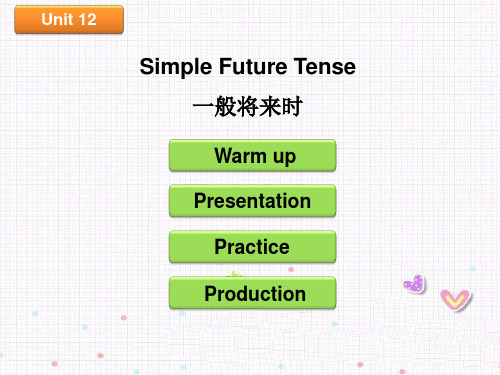一般将来时.ppt
(完整版)一般将来时课件(PPT)

2.与“next一家” 连用
next
time year week month term Monday at 7:00 next Sunday morning ……
2.He will find some meat in the fridge soon. (变一般疑问句) W __i_ll he _f_in_d _a_n_y_ meat in the fridge?
3.She will stay there in a week. (对划线部分提问) __H_o_w _s_o_on_ w_i_ll__ she _s_t_a_y_ there?
We will/shall go to Beingjing next week.
He will go to Beingjing next week
(2).变一般疑问句和否定句:
They will have an English party next week. Will they have an English party next week?
2. be going to+do可表示事先计划的意图,而 will 则表示说话人当时决定的意图;
We're going to drive you home after the meeting. Don't call a taxi. We'll drive you home.
I feel ill now, and I'll go to see the doctor. I'm going to see the doctor this evening.
一般将来时ppt课件

2023/11/29
14
表示邀请或建议
总结词
表示邀请或建议某人做某事,通常用于 口语交流中。
VS
详细描述
在口语交流中,我们经常使用一般将来时 态来表示邀请或建议,例如:“Would you like to come to my house for dinner tomorrow?”(明天你想来我家 吃晚饭吗?)或者“Let's go for a walk after dinner.”(晚饭后我们去散步吧。 )
2023/11/29
23
否定句
结构
主语 + be动词(will not/shall not/can not/may not/must not等) + 动词原形
例句
I will not go to the party.(我不会去参加聚会 。)
2023/11/29
例句
They will not come to our party.(他们不会来参加我们的聚会。)
2023/11/29
16
2023/11/29
04 一般将来时的句型结构
17
主语+助动词will+动词原形
肯定句
I will go to school tomorrow.
否定句
She will not finish her homework.
疑问句
Will they arrive at the airport on time?
“The plane will arrive at 8:00 pm.”(飞机将于晚上8 点到达。)
2023/11/29
11
表示推测或预测
要点一
一般将来时可以用于根据已有的 信息和迹象做出推测或预测,…
一般将来时课件(PPT)

“be able to”表示将来有能力做某 事时,使用一般将来时形式,例如“I will be able to help you”。
情态动词如“can”、“may”、 “must”等,在一般将来时中通常直 接加动词原形,例如“I can swim”。
03
一般将来时在句子中的运用
陈述句中的使用
表示将要发生的动作或存在的状态
纠正方法
应使用正确的将来时形式,如 "He will go to the park tomorrow." 或 "He is going to the park tomorrow."
忽略动词变化规则
错误示例
They will play football in the future.(忽略了动词play在将来时中的变化)
纠正方法
在将来时中,应使用正确的助动词或情态动词形式,如 "I will be able to help you with your homework." 或 "I can help you with your homework."
错误示例
He will must finish his work before leaving.(错误地使 用了情态动词must)
作用
用于表示未来的计划、打算、预测、 假设等。
常见表达形式
will + 动词原形
表示将来的动作或状态,如“I will go to the park tomorrow.”(我明天将去公园。)
be going to + 动词原形
表示计划、打算或即将发生的动作,如“I am going to study hard this semester.”(我这 学期打算努力学习。)
一般将来时PPT课件

•一般将来时基本概念•一般将来时结构与用法•一般将来时时间状语及标志词•一般将来时与其他时态对比•一般将来时在各类从句中运用•一般将来时误区及注意事项•总结回顾与拓展延伸目录01一般将来时基本概念定义与特点定义特点表现形式will + 动词原形be going to + 动词原形现在进行时表示将来预测未来计划与安排条件与假设030201使用场景02一般将来时结构与用法主语+ be not going to + 动词原形+ 其他成分主语+ be to not (非标准用法,尽量避免使用) + 动词原形+ 其他成分主语+ will not (won't) + 动词原形+ 其他成分Will + 主语+ 动词原形+ 其他成分?Be + 主语+ going to + 动词原形+ 其他成分?Be + 主语+ to + 动词原形+其他成分?(较少使用,多用于书面语)特殊疑问词动词原形特殊疑问词going to +成分?特殊疑问词to +(较少使用,多用于书面语)注意:在一般将来时的使用中,要注意区分不同语境和表达方式的细微差别,选择合适的结构进行表达。
同时,也要注意与其他时态的区分和联系,避免混淆使用。
特殊疑问句结构03一般将来时时间状语及标志词常见时间状语表示将来的时间状语表示计划或安排的时间状语标志词识别与运用04一般将来时与其他时态对比与现在进行时对比时间指向不同01动词形式差异02使用情境不同03时间基准差异动词形式变化使用情境区别时间范围不同动词形式区别使用情境差异05一般将来时在各类从句中运用在宾语从句中运用01 02定语从句的时态取决于它所修饰的先行词,如果先行词是将来时态,定语从句也使用将来时态。
如果先行词是过去将来时,定语从句则使用过去将来时。
定语从句中表示将来的时间状语有:tomorrow, next year, in the future 等。
06一般将来时误区及注意事项误区二过度使用“will”和“going to”。
一般将来时课件ppt(共17张PPT)

Jim going to
afternoon?
in the playground tomorrow
4. .Jim is going to play football in the playground tomorrow afternoon.
Jim going to play football tomorrow afternoon?
2)在浊辅音和元音后读/d/.
一般过去时, 要用动词过去式. Jim is going to play football in the playground tomorrow afternoon.
Jim is going to play football in the playground tomorrow afternoon. ⑵are变为were。
there were many beautiful flowers there. 一般将来时表示将来某个时间要发生的动作或存在的状态常与表示将来的时间状语连用
⑴am ,is变为was。
So she They to read some books.
What did they do in the park? 1)在清辅音后读/t/ .
(3).动词过去式变化规则
a)一般情况下,直接加ed.如:wash--washed, look---looked; b)以不发音字母e结尾的,加d.如:like---
liked, dance---danced; c)以“辅音字母+y”结尾的,变y为i再加ed. 如:study---studied;
food and (play) lots of games. They
(come) home at 4:30.
一般将来时PPT课件

一、单项选择
(C) 1. There __________ a meeting tomorrow afternoon.
A. will be going to B. will going to be C. is going to
shall常用于第一人称. shall
否定式:shall not = shan’t
will常用于第二、三人称,但在 will 口语中各种人称都可以用will.
否定式:will not = won’t
四、现_在___进__行___时态 + 表示将来的时 间状语也可以表示将来。
五、There be 句型的一般将来时态 的结构:there +is_g_o_in_g_to_ + be + 名词或there + will+ be + 名词。
begoingto表示根据主观判断将来肯定发生的事情表示根据主观判断将来肯定发生的事情will表示客观上将来势必发生的事情
The Simple Future Tense
一、一般将来时表示将来某一 时刻的动作,状态以及打算。 该时态一般与表示将来意义 的时间状语连用。如:
tomorrow, this month, the day
next week.
A. will be; is
B. is; is C. will be; will be D.
is; will be
(D) 4. There ________ a dolphin show in the zoo
tomorrow evening.
A. was B. is going to have C. will have D. is going
一般将来时课件PPT.上课用

与“be going to + 动词原形”和“will + 动词原形”相比,“be about to + 动词原形”更强调即将发生的紧迫性。
04
一般将来时的否定形式
will not = won’t
01
"will not" 是 "will" 的否定形式 ,表示将来某个时间不会发生某 件事情。
明年这个时候我们将在巴黎度假。
表示未来的时间状语从句的连用
一旦你完成这个项目, 你就可以休息了。
即使明天下雨,我们 也会按时举行运动会。
只要他一回来,我们 就出发。
表示未来的时间状语从句的省略
明天见。 下周再见。
明天这个时候我们会在飞机上。
THANKS
主语 + will not + 动词原形 + 其他成分,例如:He will not come back until next month.(他下个月之前不会回来。)
Will + 主语 + 动词原形 + 其他成分,例如:Will you be available this afternoon?(你今天下午有空吗?)
表示预测和推测
总结词
一般将来时也可以用来表示对未来的预测和推测,通常基于 某种事实或证据。
详细描述
当我们根据已知事实或证据推断某件事情将在未来发生时, 可以使用一般将来时。例如,“根据天气预报,明天会下雨 ”表示对天气的预测,“根据市场趋势,明年房价可能会上 涨”表示对未来的推测。
表示意愿和打算
05
一般将来时的疑问形式
will + 主语 + 动词原形?
总结词
小学英语语法课件- 一般将来时 (共36张PPT) 全国通用

Presentation Sentences
She will take swimming lessons in this vacation. 她今年假期要去学游泳。 She is going to go shopping tomorrow. 她明天要去购物。 Jim will open a shop on internet. 吉姆打算要在网络上开个店。 Jim is going to be an actor when he grows up. Jim长大了想当一名演员。
___t_o_m_o_r_ro_w_.____________________________ 一般疑问句:A__re_t_h_e_c_h_il_d_re_n_g_o_i_ng__to__w_a_tc_h_a_d_o_l_p_h_in_s_h_o_w__
t_o_m_o_r_ro_w_?____________________________ There will be a great concert next week. 否定句:_T_h_e_r_e_w_il_l _n_o_t b_e__a_g_re_a_t_c_o_n_ce_r_t _n_ex_t_w_e_e_k_. ______ 一般疑问句:_W_i_ll_th_e_r_e_b_e_a_g_r_e_a_t _co_n_c_e_rt_n_e_x_t_w_e_e_k?______
Practice Oral Practice
小组合作完成单项选择,并朗读句子
( C ) There __________ a meeting tomorrow afternoon.
A. will be going to
B. will going to be
C. is going to be
一般将来时课件(共12张PPT)

五、用“be+动词不定式”或用“be about to +动词原形”的结构表示。如:
1. He is to visit Japan next year. 明年他
2. They're about to leave. (=They're leavi
请认真观察答句,根据答句写出问句。
are you going to do tomorrow? 1\ What __________________________________ We are going to take a trip tomorrow. 2\ __________________________________ What is Sarah going to buy? Sarah is going to buy a comic book . 3\ __________________________________ Where are they going this evening? They are going to the cinema this evening. When is Mike going to the park? 4\ __________________________________ Mike is going to the park next week. How are you going to the zoo? 5\ __________________________________ I’m going to the zoo by bike. 6\ _________________________________ Are you going to read books tonight? Yes, I am going to read books tonight. Is she going to play football after school? 7\ _________________________________ No, she is going to play basketball after school. Do you go there by bus? 8\ __________________________________ No, I go there on foot.
一般将来时课件PPT

Functional Practise:
1.Students will go to school in the future.(一般疑问句) _W_ill st_ude_nts _go_ to school in the future. 2.There will be some robots in our homes.(改为否定句) There _wo_n`t _be_ a_ny_ robots in our homes. 3.Everyone will have a small car.(对划线部分提问) _Wh_at _wi_ll everyone _hav_e ?
[注意]:无论后面加单数名词或复数形式,be都必须用原
形。
There will be only one country. There is going to be a football match tomorrow.
注意:在口语中,所有人称都可以用will.
be going to+动词原形”和“will+动词 原形” 的区别
❖ 一般疑问句:把be 动词提到句子主语之前,结尾变问号。
❖
Are you going to have a picnic tomorrow?
will 引导的一般将来时:表示将来发生的动作或存在的状态, 最基本的结构:will + 动词原形 肯定句:主语+ will +动词原形+(宾语)+其他
Some day people will go to the moon . 否定句:在will 的后面加not即可。will not 可缩写为 won’t
❖ 3)in+一段时间(回答how soon) ❖ 4)in the future ❖ 5)this Sunday/evening ❖ 6)from now on ❖ 7)one day, someday (未来的)某天 ❖ 8)soon
高中英语一般将来时 PPT课件 图文

• ③ be + 动词不定式 • 这一结构中的be,只有现在式 (am, is, are) 和
过去式 (was, were) 两种形式。
• a. 表示按计划或安排将要发生的动作
• The highway is to be open to traffic in May. • 这条公路将在五月份通车。
• ①用于“பைடு நூலகம் expect, I‘m sure, I think, I wonder + 宾语从 句”中
• Don't worry about the exam. I'm sure you'll pass. • 不要担心这次考试,我确信你会通过的。 • I wonder what will happen. • 我不知道将会发生什么事。 • I don't think the test will be very difficult. • 我想这次测验不会太难。
• Flowers will die without water. • 没有水花会枯死的。 • Water will change into ice at 0℃. • 水在零摄氏度就会结冰。 • This will be your sister, I guess. • 我猜想这是你姐姐。
(三)一般将来时的常用结构
• She will get better.
• 她的病会好的。(认为最终会恢复健康的)
• 2)will表示将来,通常是指事先无计划的意图,是临时决定的;
be going to则表示事先有计划的意图,是经过考虑的。 • — George phoned while you were out. • 你外出的时候乔治打电话来的。 • — Ok. I'll phone him back. • 好的,我给他回电话。(临时决定) • — Matthew phoned while you were out. • 你外出的时候马修打电话来了。 • — Yes, I know. I'm going to phone him back. • 是的,我知道了。我准备给他回电话。(早有安排) • 但在正式文体中,要用will来表示事先安排的动作。 • The meeting will begin at 10:00 a.m.. • 会议将在10点开始。 • Coffee will be served from 9:30 from today onwards. • 从今天起9:30开始供应咖啡。
初一英语语法:一般将来时(共12张PPT)

3) He is going to go fishing next week . What is he going to do next week ?
1. I’m going to __C__ some music this evening.
A. are,is B. is,is C. is,will be
B
7.Mother ____me a nice presrnt on my next birthday. A. is going to gives B. is going to give C. gives
B
8. B a concert next Satyrday?
小学英语 语法
一般将来时
我们也要学习
学习目标
1.一般将来时的概念。 2.一般将来时的构成。 3.与一般将来时连用的时间状语。 4.基本句型及其变化规则。 5.会灵活运用一般将来时(练习)。
一. 一般将来时的概念。
1.表示在将来某一时间将要发生的动作
或存在的状态, 2. 表示计划、打算或准备的事情。 1)They are going to the cinema.
天th…e day after tomorrow 后天
next week / Sunday / month / year下周/…
soon 很快 不久 in three days 三天后 in the future 将来
四. 基本句型
1. 肯定句:主语 + be going to + v.原型+其它 I am going to visit Australia. She is going to buy some clothes. They are going to play computer games.
一般将来时课件(PPT)

现在进行时表示
总结词
表示现在正在进行的动作,暗示将来还会继 续
详细描述
现在进行时可以用来表示现在正在进行的动 作,并暗示将来还会继续。例如,“I am studying for the exam next week.”(我 正在为下周的考试学习。)
一般现在时表示
总结词
表示现在经常发生的动作或存在的状态,暗 示将来也会如此
详细描述
使用"will+动词原形"的结构来表示将来 某个时间点将要发生的动作或状态,例 如"I will go to the park tomorrow." (明天我将去公园)。
be going to+动词原形
总结词
表示计划或安排将来要发生的动作或状态。
详细描述
使用"be going to+动词原形"的结构来表示计划或安排将来要发生的动作或状 态,例如"I am going to have a party next weekend."(下周末我将举办一个 聚会)。
详细描述
使用“be going to+动词原形”的结构来表示计划或安排将来发生的动作,例如“We are going to have a par来某个时间正在进行的动作。
详细描述
使用现在进行时来表达将来某个时间正在进行的动作,例如“I am meeting my friend tomorrow” 。
一般将来时课件
目录
• 一般将来时的定义 • 一般将来时的句型结构 • 一般将来时的肯定句 • 一般将来时的否定句 • 一般将来时的疑问句
01
一般将来时的定义
什么是将来时态
01
一般将来时课件(PPT)

一般将来时的特殊疑问句形式
Will + 主语 + 动词原形 + 其他?,用于询 问将来某个时间是否会发生某个动作或存 在某个状态。
特殊疑问词 + will + 主语 + 动词原形 + 其 他?,用于对将来某个时间发生的动作或状 态进行具体询问。
相关语法点串联
与一般现在时的对比
一般现在时表示经常性、习惯性的动作或状态,而一般将 来时则表示将来某个时间要发生的动作或存在的状态。
01
2. 题目
They _____ (not visit) their grandparents next week.
03
3. 题目 you (have) a meeting next Monday?
05
02
解析
根据时间状语tomorrow可知,该句应用一 般将来时,填will go。
04
解析
根据时间状语next week可知,该句 应用一般将来时的否定形式,填 won't visit。
Be (Am, Is, Are) + 主语 + going to + 动词原形 + 其他成
分?
Will there be + 主语 + 其他成 分?
03
时间状语从句与主句时态关系
主将从现原则
常见的引导词有
when, as, after, before, until, unless, as soon as 等。
特殊情况处理
01
例子
02
You can call me when you are passing my house. (当你经过我 家时,你可以给我打电话。)
2024版高中一般将来时PPT课件图文

表示客观必然性
有些情况下,一般将来时 可以表示客观必然性,如 The sun will rise tomorrow.
05 练习题及答案解 析
填空题专项训练
根据句意和所给汉语 提示,填写正确的动 词形式。
根据语境和时态提示, 填入正确的动词形式, 完成句子。
用所给动词的适当形 式填空,使句子意思 完整、通顺。
计划和打算
一般将来时也可以用于表达个人的计划、打算或安排,例如:They will arrive at the airport at 9:00.(他们将于9点到达机场。)
条件和可能性表达
条件状语从句
在if或unless等引导的条件状语从句中,主句用一般将来时,从 句用一般现在时表示将来,例如:If it doesn't rain tomorrow, we will go for a picnic.(如果明天不下雨,我们就去野餐。)
礼貌原则在跨文化交际中应用
尊重对方文化
01
在跨文化交际中,应尊重对方的文化背景和习惯,避免使用可
能引起误解或冲突的未来表达方式。
谨慎承诺
02
在不确定能否履行承诺的情况下,应谨慎使用过于确定的未来
表达方式,以免造成不必要的误解或压力。
适时调整
03
根据交际的进展和对方的反馈,适时调整自己的未来表达方式,
或存在的状态。
否定句
主语 + will/shall + not + 动词原 形,表示将来某个时间不会发生的 动作或不存在的状态。
疑问句
Will/Shall + 主语 + 动词原形,用 于询问将来某个时间是否要发生某 个动作或存在某个状态。
一般将来时课件PPT

情态动词练习
总结词
理解情态动词在否定句中的作用
详细描述
解释情态动词如"can't", "won't", "shouldn't"等在否定句中的用法,并 通过例句和练习加深学生对情态动词 的理解。
助动词will练习
总结词
熟悉助动词"will"的否定形式
详细描述
介绍助动词"will"的否定形式"won't", 并通过例句和练习让学生熟练掌握其 用法,如"He won't come tomorrow."等。
助动词will练习
总结词
掌握助动词的用法
详细描述
通过助动词"will"的练习,学生可以进一步了解助动词在一般 将来时中的用法。学生将学习如何正确使用助动词与其他时 态连用,如过去将来时和将来完成时。
05
一般将来时的否定句练习
简单句练习
总结词
掌握简单句的否定形式
详细描述
通过例句和练习,让学生掌握一 般将来时的简单句否定形式,如 "I will not go to the party."和 "She will not buy that car."等。
结构
一般将来时的基本结构是“主语+will+动词原形”,有时也可以用“be going to+动词原形”来表示。
特点
预测性
不确定性
一般将来时主要用来表示对未来的预 测,包括个人的预测、科学的预测和 基于事实的预测。
一般将来时也可以表示对未来事件的 不确定性,例如“I will see you later, but I'm not sure when.”。
英语语法一般将来时 课件 (共35张PPT)

选择:要动动脑啦
1. My younger brother ____be 15 years old next year.
A. will B. is going C. should
2. — Sorry, I forgot to post the letter for you.
— Never mind, _____ post it myself tonight.
Vicky w__ill__be_ 15 years old next year.(be) Vicky 明年15岁了
Will 表示单纯“将要,将来会”无计划性,陈 述事实
三、句型变化 1. 肯定句: 主语+ will +V原型
I will be a teacher in the future. 2.否定句:主语 + will not(won’t)+V原型
be 随主语有am is are 变化
1. 肯定句: 主语 + be going to + V原型
I am going to fly kites the day after tomorrow.
2. 否定句:主语 + be not going to + V原型
She is not going to be a doctor when she grows up.
B: He will go to Australia. A:What will he do?
B: He will see kangaroos
2.be going to+动词原形
be going to ①表示计划,安排要做的事 ②表示现在的迹象推断未来可能
一般将来时_ppt

一般将来时表示将来某个时间要发生的动作
或存在的状态,常与表示将来的时间状语 连用。
标志性词:tomorrow, next, soon等
结构:be going to +动词(原)
will+动词(原)
will 引导的一般将来时:表示将来发生的动作或存在的状态, 最基本的结构:will + 动词原形
Helen is going to read books in the library next weekend. Where is Helen going to read books next weekend?
Helen is going to read books in the library next weekend.
Will students go to school in the future ?
特殊疑问句:特殊疑问词+will +主语+动词原形+其他?
Be + going + to
肯定句 :主语 + be ( am, is, are ) + going to + 动词原形 eg. I’m going to go there next month. 下个月我将去那里。 He is going to visit his grandparents next year. 明年他将要去看望他的爷爷奶奶。 They are going to find a new house to live in. 他们将要找一所新房子住。 否定句 : 主语 + be ( am, is, are ) + not + going to + 动词原形 eg. He isn’t going to see the movie. 他不会去看电影。 You aren’t going to work on the farm this weekend. 这个周末你们不去家场劳动。 We aren’t going to have a meeting this afternoon. 今天下午我们不开会。 疑问句 Be ( am, is, are ) + 主语 + going to + 动词原形 eg. Are you going to have a party tomorrow? 明天你们要开联欢会吗? Is he going to write to his friends? 他要给他的朋友写信吗? Are they going to buy a new car? 他们要买一辆新车吗? 特殊疑问句 特殊疑问词 + be ( am, is, are ) + 主语 + going to + 动词原形 eg. What are you going to have tomorrow? 明天你们要吃什么? What are you going to do tonight? I’m going to watch the baseball game. 今晚你打算做什么?我想要看棒球赛。
- 1、下载文档前请自行甄别文档内容的完整性,平台不提供额外的编辑、内容补充、找答案等附加服务。
- 2、"仅部分预览"的文档,不可在线预览部分如存在完整性等问题,可反馈申请退款(可完整预览的文档不适用该条件!)。
- 3、如文档侵犯您的权益,请联系客服反馈,我们会尽快为您处理(人工客服工作时间:9:00-18:30)。
用所给动词的正确形式填空
1.I am going to do (do) my homework tonight.
2.We are going to water (water) the flowers this afternoon. 3.He is going to buy (buy) a CD next Saturday.
二、will(shall)+ 动词原形与 to be going to + 动词原形两种句型表示将来 的区别
两者有时可以通用, 但两者有时有区别:
只是单纯地预测未来的事,此时可与will互换。例如: I think it is going to/will rain this evening. 我认为今晚要 下雨。 1.当表示主观方面“打算,准备” 去做什么事情的时 候,往往用be going to +动词原形,而will 则多用来表示 纯属客观的将来: ----What are you going to do this evening?
The end
Thank you
(二). be going to+动词原形 1. 表示说话人根据现在已有的迹象,判断将要或即将 发生某种情况。这类句子的主语可以是人,也可是物。 例如: There is going to be a football match in our school tomorrow afternoon. 明天下午我们学校将有一场足球赛。 (已有告示) 2. 表示主语现在的意图或现已作出的决定,即打算在最 近或将来进行某事。例如: He isn’t going to see his elder brother tomorrow. 他明天不 准备去看他哥哥。
----I’m going to see a film.
You will be forty years old next year. Tomorrow will be Sunday again.
2. be going to+动词原形可表示事先计划的意图,而 will 则表示说话人当时决定的意图; We're going to drive you home after the meeting. Don't call a taxi. We'll drive you home. I feel ill now, and I'll go to see the doctor. I'm going to see the doctor this evening. He is studying hard and is going to try for the exams. 他 正努力学习,准备参加考试。(不能用will替换) —Can somebody help me? ——谁能帮我一下吗? —I will. ——我来。(不能用be going to替换)
4.You are going to read(read) books on the weekend.
5.They are going to (go) the cinema this evening.
6.My parents are going to fly (fly) to Beijing tomorrow.
(一). shall/will+动词原形
1.will可用于所有人称,但shall 仅表示单纯将来时, 用于第一人称I和we,作为will的一种替代形式。
2. will , shall可用来预言将来发生的事。如说出我们设 想会发生的事,或者请对方预言将要发生什么事。例如: It will rain tomorrow. 明天将要下雨。
缩写形式: 'll ==shall/will he will= he’ll shan't== shall not won't == will not
疑问式: Shall/Will+主语+动词原形+其他 助动词 Will 主语 she 动词原形 be an engineer?
Will
they
go there?
一般将来时的主要用法:
1、表示将来某一时刻的动作或状态: We shall(will) come to see you the day after tomorrow. There will be a wonderful show next week.
2、表示将来某一段时间内经常的动作或状态: The students will come and work in the lab once a week. we shall come and work in this factory every year.
三、be about to 结构表示将来
表示即将要发生的动作. Hurry up! We're about to leave. The football match is about to begin in a few minutes.
四、Revision of all forms with future meaning
----- Will they go there to study English? ----- Yes, they will. ----- No, they will not.
Shall we have a drink? Shall I open the window? Where shall we have the meeting? 表示说话人征求对方的意见 Will you pass me that cup? Will you (please) help me with maths? Will you please lend me your pen? will 在陈述句中用于各人称,在争求意见时或 示说话人向对方提出请求常用于第二人称。
特殊疑问句
一般将来时的特殊疑问句是将疑问词放在句首,后接 一般疑问句. (就主语提问时,以疑问词 who 开头的疑问句除外.) 疑问词 一般疑问句
What
Hale Waihona Puke will they do in Ningbo?
Why
will he come here?
---- Why will you be here on Sunday? ---- I’ll have a meeting on Sunday. 对特殊疑问句要进行具体回答。
(否) No,主语+shall/will+not …
肯定式: 主语+shall/will+动词原形+其他 否定式: 主语+shall/will+not+动词原形+其他.
谓语
主语
I, we He, She, You, They
助动词
Shall (will) not
动词原形
go (be)…. Will not
一、一般将来时的构成及用法:
一般将来时表示将来发生的动作或存在的状态 助动词shall/will + 动词原形(当主语第一人称时, 一般用shall,shall用于第一人称,常被will 所代 替。)
肯定式: 主语+shall/will+动词原形+其他 否定式: 主语+shall/will+not+动词原形+其他. 疑问式: Shall/Will+主语+动词原形+其他 简略回答: (肯) Yes,主语+shall/will .
